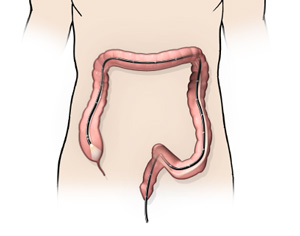What is Screening Colonoscopy?

Colonoscopy is a procedure used to view the large intestine (colon and rectum) using an instrument called a colonoscope, a flexible tube with a small camera and light source attached to its tip. Colonoscopy can be performed for screening or diagnostic purposes. While diagnostic colonoscopy is performed to confirm the presence of colorectal cancer or colorectal polyps from a person showing symptoms (blood in stools, anemia, etc.), screening colonoscopy is performed on an asymptomatic person without any prior history of the two conditions.
Screening colonoscopy is indicated for the following:
- Family history (first degree relative) of colon cancer or polyps
- Inflammatory bowel disease
Procedure of Colonoscopy
Colonoscopy is usually performed under sedation on an outpatient basis. You will be given a laxative or enema preparation to clear your bowels before the procedure. Air will be pumped into the colon to expand it for better visibility. The colonoscope is inserted into the rectum and gently moved up the colon until it reaches the caecum (junction of the small and large intestine). The colonoscope is then withdrawn slowly as the camera relays pictures of the colon and rectum lining onto a large screen for your doctor to view. Any polyps or growths detected by the colonoscope can be removed and sent to the lab for determining whether it is cancerous or not (biopsy).
Screening colonoscopy is a very sensitive test. However, some cancers, small polyps or nonpolypoid lesions may go unnoticed, and the procedure may be associated with the risk of bleeding, tearing or perforation of the colon lining, especially during the polypectomy.
Age 45*
Screening is recommended if you are 45 years of age or older, with no risk factors. The test is ordered earlier if you have a family history (first-degree relative: parent, sibling or child) of colorectal cancer or polyps. If the relative was diagnosed at <60 years of age or if two relatives were diagnosed at any age, you are advised to have a screening colonoscopy at 40 years of age or 10 years before the age of the earliest diagnosis (whichever comes first). The screening needs to be repeated every 5 years. If the relative was diagnosed at ≥60 years of age or if two relatives were diagnosed at any age, you are advised to have a screening colonoscopy at 40 years of age, and repeat every 10 years.
*The screening colonoscopy age has changed from 50 to 45 years in the US because of the increasing incidence and mortality of colorectal cancer among younger adults.
